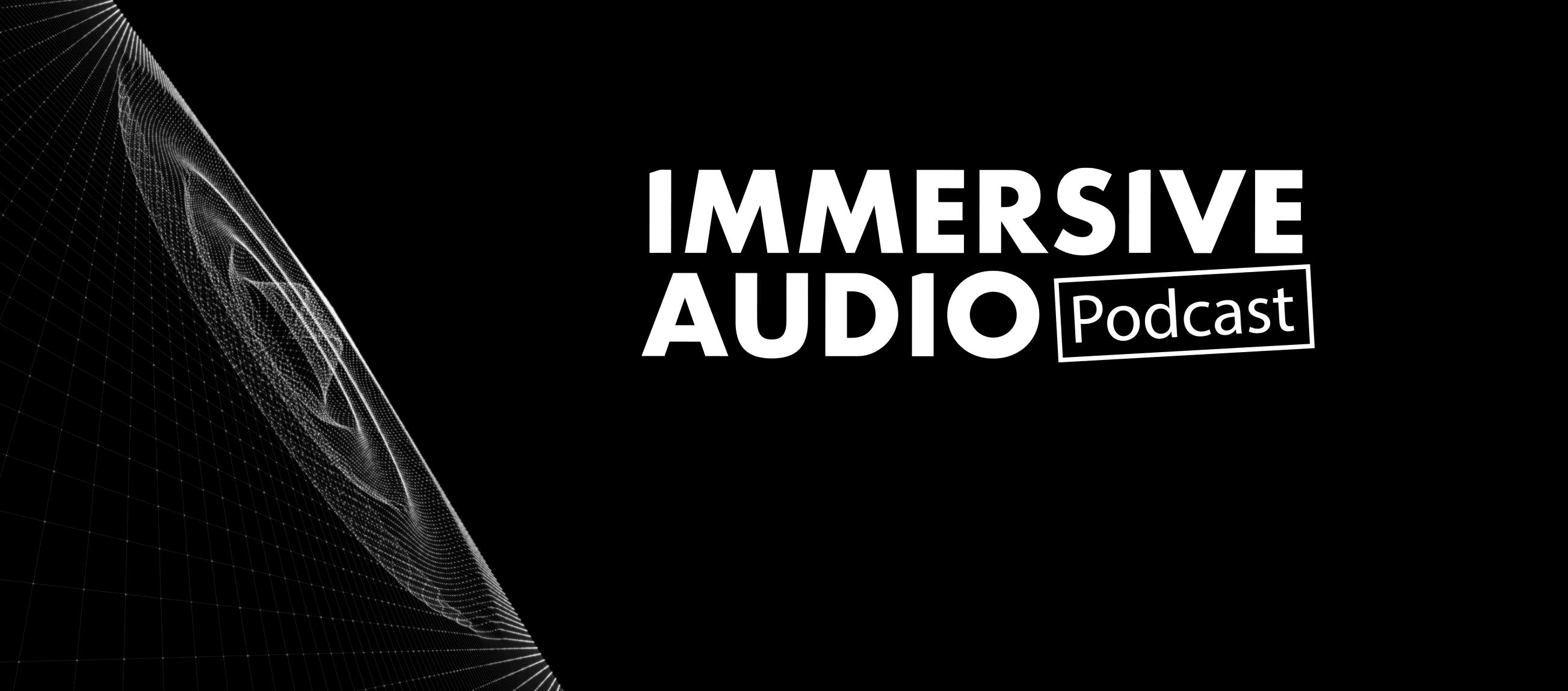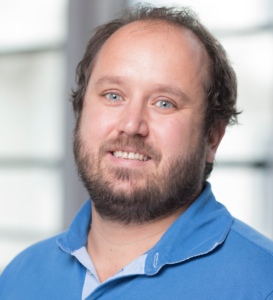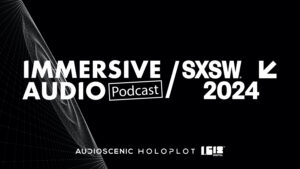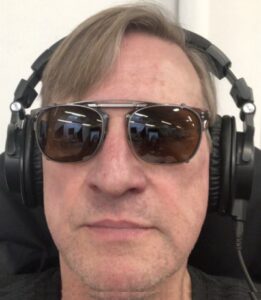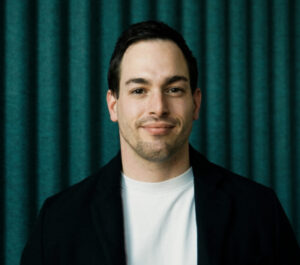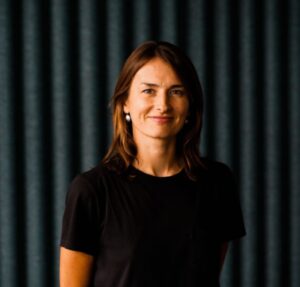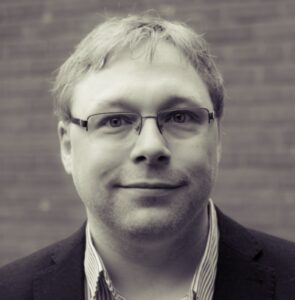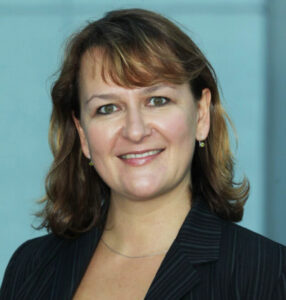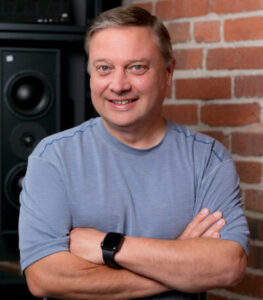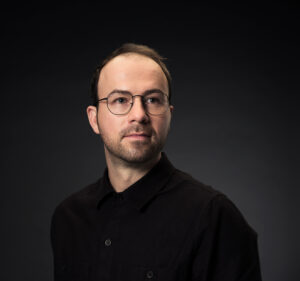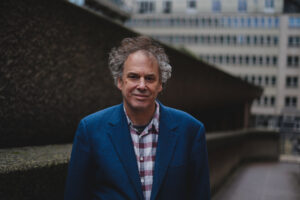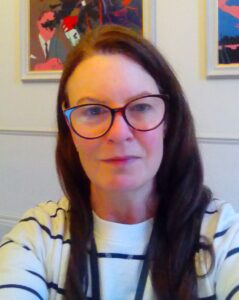
Summary
In this episode of the Immersive Audio Podcast, Oliver Kadel travels to Southampton, UK, to visit the HQ of Audioscenic, whose mission is to revolutionise and pivot binaural audio over speakers to the masses. Their team developed technology that uses real-time head tracking and sound-field control to create virtual headphones that render personal 3D Audio to the listener’s position. Their first commercial success came in the form of a partnership with Razer and the subsequent release of Leviathan V2 Pro Soundbar, which was announced in early 2023 at CES. Since then, their technology received a number of tech awards and mainly the support of the user community. We sat down with the core team members and the early adopters to find out where it all started and where it is heading.
Listen to Podcast
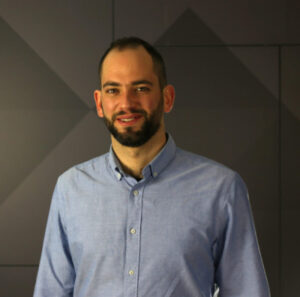
Marcos Simón (Co-Founder, CTO)
Marcos Simón graduated in 2010 from the Technical University of Madrid with a B.Sc. in telecommunications. In 2011, he joined the Institute of Sound and Vibration Research, where he worked with loudspeaker arrays for sound field control and 3D audio rendering and also in the modelling of cochlear mechanics. He obtained his PhD title in 2014, and between 2014 and 2019, he was part of the S3A Research Programme “Future Spatial Audio for an Immersive Listening Experience at Home”. In 2019 he co-founded Audioscenic to commercialise innovative listener-adaptive audio technologies, where he currently works as Chief Technical Officer. Since the company’s creation, Marcos has been leading the vision of Audioscenic and established himself as a nexus between the commercial and technical world for the start-up, ensuring that the technology is continually evolving and that the customers understand exactly what the technology makes possible.
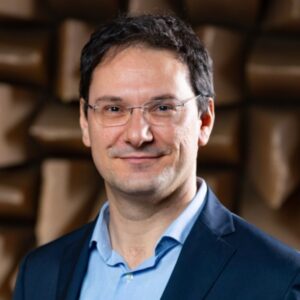
Professor Filippo Fazi (Co-Founder/Chief Scientist)
Prof Fazi is the co-founder and Chief Scientist of Audioscenic Ltd, where he leads the scientific development of new audio technologies and contributes to the company’s strategic decisions. He is also a Professor of Acoustics and Signal Processing at the Institute of Sound and Vibration Research (ISVR) of the University of Southampton, where he is the Head of the Acoustics Group and the Virtual Acoustics and Audio Engineering teams. He also served as Director of Research at the Institute and sits on the Intellectual Property panel of the Faculty of Engineering of Physical Sciences. He is an internationally recognised expert in audio technologies, electroacoustics and digital signal processing, with a special focus on 3D audio, acoustical inverse problems, multi-channel systems, and acoustic arrays. He is the author of more than 160 scientific publications and co-inventor of Audioscenic’s patented or patent-pending technologies. Prof Fazi graduated in Mechanical Engineering from the University of Brescia (Italy) in 2005 with a master’s thesis on room acoustics. He obtained his PhD in acoustics from the Institute of Sound and Vibration Research in 2010, with a thesis on sound field reproduction. Prof Fazi was awarded a research fellowship by the Royal Academy of Engineering in 2010 and the Tyndall Medal by the Institute of Acoustics in 2018. He is a fellow of the Audio Engineering Society and a member of the Institute of Acoustics.
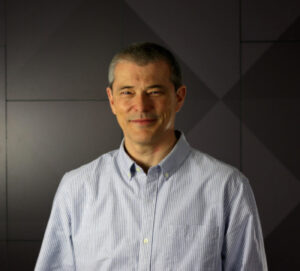
David Monteith (CEO)
David is the Chief Executive Office of Audioscenic Ltd, responsible for the strategic direction of the business. David holds a Master’s degree in Physics, in Opto-Electronics and an MBA. David began his career developing optical fibre components before joining EMI Central Research Laboratories, where he led the creation of spin-out Sensaura Ltd. The company’s 3D Audio technology shipped with the Microsoft Xbox and on over 500 million PCs. The Sensaura business was sold to Creative Labs. In 2001 David was part of the Sensaura team that received the Royal Academy of Engineering Mac Robert Award for innovation in engineering. In 2003 David founded Sonaptic Ltd. In his role as CEO, David led the company to licence its audio technology to Mobile phone vendors and portable games platforms such as the Sony PSP. Sonaptic was sold to Wolfson Semiconductors in 2007. David then held the VP of Business Development position in Wolfson, bringing to market the first Wolfson ANC chip featuring the Sonaptic technology. From 2010- 16 David was CEO/founder of Incus Laboratories. Incus developed and licensed its novel digital ANC technology to companies such as Yamaha before being acquired by AMS AG. In 2019 David joined Audioscenic, working with Marcos and Filippo to raise the initial Seed investment.
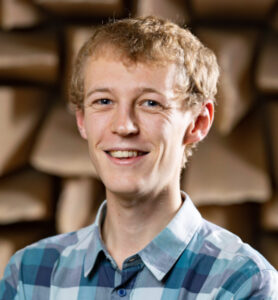
Daniel Wallace (R&D Lead)
Daniel studied acoustical engineering at the University of Southampton ISVR, graduating in 2016, then started a PhD at the Centre for Doctoral Training in Next-Generation Computational Modelling. His PhD project was on multi-zone sound field control, specifically for producing private listening zones. Since joining Audioscenic as R&D Lead in 2021, he’s turned ideas into products. Daniel firmly believes that for their technology to be successfully deployed into products, the user experience must be flawless; this means testing lots of edge cases in code and in the lab to make sure that when users sit down in front of our soundbar, it just works and gives them an amazing impression.
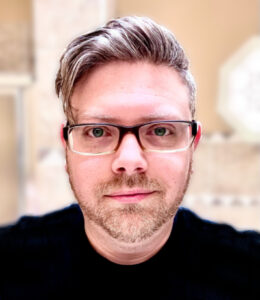
Joe Guarini (Creative Director)
Joe is a sound designer who has specialised in 3D audio content creation for over ten years. He won the jury prize for best binaural sound design in the 2014 Mixage Fou international sound competition, in addition to having his works featured in video games, film trailers, television commercials, and demonstrations at CES. Joe has been working with the Audioscenic team since 2017 to provide listeners with sounds that highlight the immersive qualities of the audio hardware. His contributions include creating computer game experiences where players can walk through, and interact with, sounds in 3D space. Joe’s passion is helping people see the full capabilities of 3D audio technology, which is why he chose to join forces with Audioscenic.
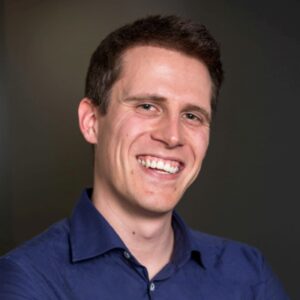
Martin Rieger (VRTonung)
Martin Rieger is a sound engineer with years of experience in immersive audio. His studio VRTonung specialises in 360° sound recordings and 3D audio postproduction, making him the auditory contact point for the complete realisation of XR projects from creative storytelling at the beginning until the technical implementation. He is also running the most dedicated blog on 3d audio vrtonung.de/blog, setting guidelines for making spatial audio more accessible and building a foundation for the next generation of immersive content. Martin is a certified delegate of the German Institute for vocational training, teaching teachers what immersive audio means in various media with or without visuals, head tracking or interactive elements. This will set the background for the new job profile “designer for immersive media”.
Show Notes
Audioscenic Official Website – https://www.audioscenic.com/
University of Southampton – https://www.southampton.ac.uk/
Razer Official Website – https://www.razer.com/
Razer Leviathan V2 Pro – https://www.razer.com/gb-en/gaming-speakers/razer-leviathan-v2-pro
Marcos Simón LinkedIn – https://www.linkedin.com/in/drmfsg/
Filippo Fazi LinkedIn – https://www.linkedin.com/in/filippo-fazi-4a822443/
David Monteith LinkedIn – https://www.linkedin.com/in/david-monteith-8a66221/
Daniel Wallace LinkedIn – https://www.linkedin.com/in/danielwallace42/
Joe Gaurini – https://www.linkedin.com/in/joseph-guarini-695b8053/
Martin Rieger – https://www.linkedin.com/in/martin-rieger/
VRTonung – https://www.vrtonung.de/en/blog/
Survey
We want to hear from you! We really value our community and would appreciate it if you would take our very quick survey and help us make the Immersive Audio Podcast even better: surveymonkey.co.uk/r/3Y9B2MJ Thank you!
Credits
This episode was produced by Oliver Kadel and Emma Rees and included music by Rhythm Scott.


